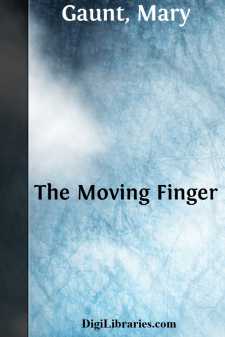Categories
- Antiques & Collectibles 13
- Architecture 36
- Art 48
- Bibles 22
- Biography & Autobiography 813
- Body, Mind & Spirit 142
- Business & Economics 28
- Children's Books 15
- Children's Fiction 12
- Computers 4
- Cooking 94
- Crafts & Hobbies 4
- Drama 346
- Education 46
- Family & Relationships 57
- Fiction 11828
- Games 19
- Gardening 17
- Health & Fitness 34
- History 1377
- House & Home 1
- Humor 147
- Juvenile Fiction 1873
- Juvenile Nonfiction 202
- Language Arts & Disciplines 88
- Law 16
- Literary Collections 686
- Literary Criticism 179
- Mathematics 13
- Medical 41
- Music 40
- Nature 179
- Non-Classifiable 1768
- Performing Arts 7
- Periodicals 1453
- Philosophy 64
- Photography 2
- Poetry 896
- Political Science 203
- Psychology 42
- Reference 154
- Religion 513
- Science 126
- Self-Help 84
- Social Science 81
- Sports & Recreation 34
- Study Aids 3
- Technology & Engineering 59
- Transportation 23
- Travel 463
- True Crime 29
The Moving Finger
by: Mary Gaunt
Categories:
Description:
Excerpt
TROTTING COB
"Hi—hey—hold up there, mare, will you? What did you say, mister? A light? Yes. That 's Trotting Cob, that is. The missus 'll give us a cup of tea, but that's about all. Devil fly away with the mare. What is it? Something white in the road? Water by ——. Thank the Lord, they Ve had plenty of rain this year. But they do say there's a ghost hereabouts—a Trotting Cob, with a man in white on him? Lord, no, that's an old woman's tale. But the girl—she walks—she walks they say, and mighty good reason—too—if all tales be true. Hosses always shy here if they Ve at all skittish. Got that letter, Jack, and the tobacco? That's right! Rum, isn't it, to get all your news of the world at dead of night? Reg'ler as clockwork we pass—a little after one, and the coach from Deniliquin she passes an hour or so earlier.
"Anybody else? Well, no, not as a rule. It's the stock route? you see, between Hay and Deniliquin, so there's bound to be stock on the way; but sheep, bless you! they travel six miles a day, and cattle they ain't so much faster, so we brings 'em all the news. The Company has stables here, and feed, and we change horses. The old man and old woman keep it, with a boy or two. Mighty dull for the old woman, I should think, with on'y the ghost to keep her company. She was her cousin or her aunt or somethin', the ghost was, and, Lord, women is fools an' no mistake." It was July, and the winter rains had just fallen, so that the plains, contrary to custom, were a regular sea of mud.
The wheels sank axle deep in it. The horses floundered through it in the darkness, and every now and then the lamps were reflected in a big pool of shallow water. The wind blew keen and cold, but the coach was full inside and out, and so, though it was pitch dark, I kept my seat by the driver.
A light gleamed up out of the darkness.
"Trotting Cob!" said he, and discoursed upon it till he pulled up his horses on their haunches exactly opposite a wide-open door, where the lamplight displayed a rudely-laid table and a bright fire, which seemed hospitably to beckon us in. The whole place was as wide awake as if it were noon instead of midnight.
Ten minutes' stay, and we were off again into the darkness, and then I prevailed upon the driver to tell me the tale of Trotting Cob. He told it in his own way. He interlarded his speech with strange oaths. He stopped often to swear at the road, to correct the horses, and he was emphatic in his opinions on the foolishness of women, so I must e'en do as he did, and tell the tale of Trotting Cob in my own way.
A flat world—possibly to English eyes an uninteresting, desolate, dreary world; but to those who knew and loved them, they had a weird charm, all their own, those dull, gray plains that stretched away mile after mile till it seemed the horizon, unbroken by hill or tree, must be the end of the world. Trotting Cob was Murwidgee then, Murwidgee Waterhole, where all the stock stopped and watered; but from the slab hut, which was the only dwelling for miles, no waterhole was visible; the creek was simply a huge crack in the earth, and at the bottom, twenty feet below the level of the plain, was the water-hole....


